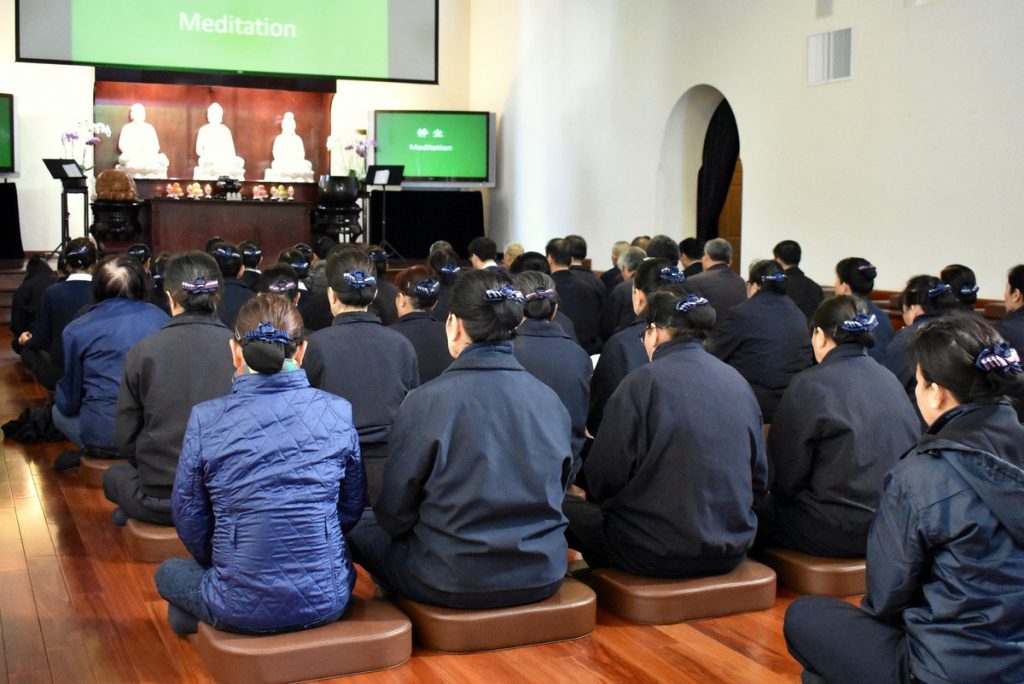
During the first teaching that Shakyamuni Buddha gave after his enlightenment, he presented the Four Noble Truths, the fourth being The Path to the Cessation of Suffering, called the Noble Eightfold Path. The eight parts of this path towards liberation are further grouped into three sections comprising fundamental aspects of Buddhist practice – wisdom, ethical conduct, and mental discipline.
The Noble Eightfold Path is:
Wisdom (Sanskrit: prajñā)
- Right View / Right Understanding
- Right Thought
Ethical Conduct (Sanskrit: śilā)
- Right Speech
- Right Behavior
- Right Livelihood
Mental Discipline (Sanskrit: samadhi)
- Right Effort
- Right Mindfulness
- Right Concentration (and Meditation)
These ancient yet timeless guides towards liberation are central to the Jing Si Dharma Lineage path, and are symbolically embedded in the Tzu Chi logo, which includes eight lotus petals. Master Cheng Yen often points out how bringing these principles to bear in daily life is vital, given today’s global challenges. She highlights how our collective lack of awareness is having a far-reaching impact.
“I am truly worried about our world. Since the start of 2011, many historic disasters have happened, signaling the distress our Mother Earth is in and how out of balance Nature has already become. Humanity has brought this about. All of us must reflect on this deeply and begin anew. Collectively, we have already built up so much negative karma through our greed, destruction of the environment, killing of other creatures, and other wrong actions. Karma is the law of cause and effect; disasters are the effects of causes that we have created. That is why I keep saying that when shocking disasters happen, we must awaken. If we can do so, it will not be too late. We can then create new causes, changing the pattern, altering our course. This is the way to prevent future disasters and proactively create peace, blessings, and well-being for our world.”
Dharma Master Cheng Yen
Master Cheng Yen teaches direct ways that can help people awaken and lead them onto the Noble Eightfold Path. One practice is called zhai jie, which means “to fast” in Chinese, yet within the Tzu Chi path, it means abstaining from eating meat, a commitment that involves both inner and outer elements.
The inner work concerns purifying our state of mind, outlook, and attitude, and to begin, we must give rise to a heart of sincerity, genuinely striving to be a better person. We then cultivate Right View, and this includes having Right Understanding of the Four Noble Truths that point to what should be abandoned. In essence, we need to eliminate craving and afflictions, or impurities of mind. When impurities such as greed, anger, hatred, pride, or selfishness arise, we can’t see clearly and our thinking becomes flawed. This has significant consequences, as thinking guides decisions and actions.
Master Cheng Yen often likens the mind to a mirror. When the mirror is clean, it can clearly reflect everything around it. But when layers of dust and grime cover it, nothing can be seen in the mirror. In the same way, when our mind is pure, it can perceive everything clearly and correctly without distortions, penetrating underlying principles. We can then begin on the path of Right Thought, and our innate Wisdom can emerge.
The outer practice of “zhai jie” involves Ethical Conduct, starting with abstention from meat. Doing so, we refrain from taking life and allow other creatures to exist in peace. Eating vegetarian not only protects them, but our sense of humanity and compassion as well. If we think about it, the taste of meat only gives satisfaction while it’s in our mouth. Yet for this fleeting moment of fulfillment, billions of creatures must die. How can we still maintain that we’re kind and loving when we deprive other creatures of life just for our palate’s enjoyment?
Studies have shown that the mass production of “meat” has a negative impact on climate change, so “zhai jie” can also bring an awareness of how our personal choices influence the world at large. This insight can guide us to living more frugally and in an earth-friendly way so as to protect our planet. Instead of pursuing a lifestyle of consumption where we seek material comfort and convenience at the expense of damaging the environment, we live more simply, becoming content with less. By cherishing what we already have, we further curb the endless stream of desires.
Skillfully, this practice leads to wholesome living that can be further supported by the Moral Precepts of Buddhism that serve as guidelines for Right Behavior. The purpose of the precepts is not to restrict, but rather to protect, since unwholesome behavior harms us and others. Practicing with vigilance will also enhance Right Mindfulness, an aspect of Mental Discipline. “Zhai jie” encapsulates many aspects of the Noble Eightfold Path.
[It can be] an expression of our utmost sincerity [which] will create a most powerful prayer for our world.
Dharma Master Cheng Yen
This blog contains edited excerpts from material written by the Jing Si Abode English Editorial Team, based on Dharma Master Cheng Yen’s conversations in Chinese.
































